Metric in Sports: Winter Games Fast Facts

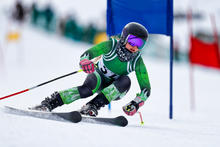
Biathlon
Biathlon consists of ten events in international competition. Men and Women compete in a sprint, pursuit, individual, and relay. In the individual events, the courses are 15 km for women and 20 km for men.
Sledding
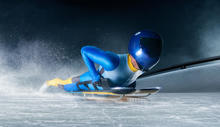
Bobsleigh consists of three events in international competition. Men and women compete in two-man/two-woman events. Men also compete in four-person events. The 4-person sled is required to be a maximum length of 3.8 m and maximum width of 0.67 m.
Skeleton is considered the world's first sliding sport. International competitive events consist of four runs timed electronically to 0.01 seconds. A skeleton sled has a maximum weight of 35 kg for women and 43 kg for men.
Curling
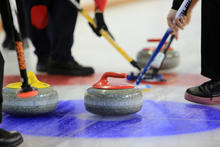
Curling is a competition between two teams with four players each. The game is played on ice, and the two teams take turns pushing a 19.1 kg stone object towards a series of concentric circles. The goal is to get the stone as close to the center of the circles as possible. The curling rink is 42.07 m long and 4.28 m wide.
Ice Hockey
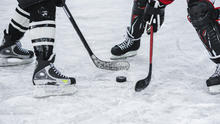
Ice Hockey has men and women teams in international competitions. Women compete in an eight-team tournament whereas men compete in a 12-team tournament. The puck is made of vulcanized rubber or other approved materials and is primarily black in color. The puck is 2.54 cm thick and 7.62 cm in diameter and must weigh between 156 g and 170 g. It can move at speeds of more than 150 km/h. Sticks are made of wood or other material, such as plastic or aluminum and are prohibited from being curved more than 1.5 cm.
Luge
Luge has four parts in which athletes take four timed runs down the track. Each run counts. The times for each part are added, and the fastest total time determines the winner. Luge competitors speed down the icy track at a range of 140 km/h, without brakes.
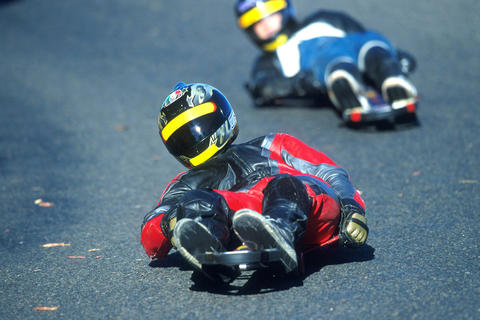
Skating
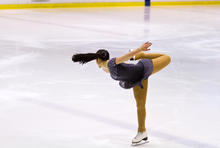
Figure Skating historically grew from necessity as a mode of transportation. Four international Figure Skating competitive events includes women singles, men singles, pairs, and ice dancing.
Short Track Speed Skating consists of eight events. Men and women compete in 500 m, 1000 m and 1500 m. There is a 5000 m relay for men, and a 3000 m relay for women. A modern figure skating blade has a very slight curve, equal to the radius of 180 cm to 220 cm.
Speed Skating at international competitions consist of ten events: 500 m, 1000 m, 1500 m, 5000 m, for both women and men, 3000 m for women, 10 000 m for men, and Team pursuit for women and men. Men speed skating blades are typically 42 cm to 46 cm long.
Skiing
Ski mountaineering combines uphill skiing, boot-packing (walking with skis), and downhill skiing in alpine terrain. It will debut at the 2026 Winter Games with a sprint race format. The sprint course includes 80 m to 100 m of uphill skiing and 20 m to 30 m vertical gain. The skis are lightweight, ranging from 600 g to 850 g each (without bindings), with a full setup weighing under 1.5 kg. Minimum ski lengths are 150 cm for women and 160 cm for men. To help with uphill movement, skis are equipped with skins that provide grip on the snow.
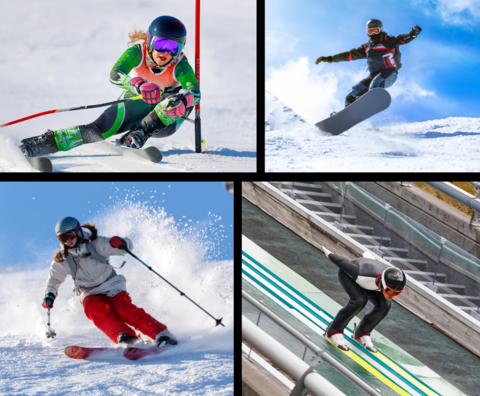
Alpine Skiing consists of ten events: five for women and five for men. The rules are the same for men and women, but the courses differ. In all cases, the time is measured to 0.01 seconds and ties are permitted.
Cross Country Skiing comprises twelve different skiing events. Women compete in the sprint, team sprint, 10 km individual start, 15 km pursuit, 30 km mass start and the 4 x 5 km relay. Men compete in the sprint, team sprint, 15 km individual start, 30 km pursuit, 50 km mass start and the 4 x 10 km relay.
Freestyle Skiing used to originally be a mix of alpine skiing and acrobatics. The moguls competition consists of a run down a heavily moguled course with two jumps. International competition aerial formats consist of a two-jump qualification followed by a two-jump final.
Nordic Combined has its 5000 year-old roots in Norway. This event involves ski jumping, which requires physical strength and technical control, and cross-country skiing which demands endurance and strength. All three Nordic combined events consist of a ski jumping competition and a cross-country skiing race.
Ski Jumping includes three ski jumping events: Individual normal hill, Individual large hill, and the Team event.
Snowboarding was developed in United States in the 1960s. There are six international winter game snowboard events: 1) men halfpipe, 2) women halfpipe, 3) men parallel giant slalom, 4) women parallel giant slalom, 5) men snowboard cross, and 6) women snowboard cross.
Resources
- Why are skis so long (ScienceNews). While watching the winter games you might wonder why skis, featured in several events, are so long. This science activity uses an action figure and flour to simulate skiing (6th grade).
- Sports Numbers (NCTM). In this activity, students apply their knowledge and interpret how numbers are used in a variety of sports scenarios (3rd to 5thgrade).
- Metric in Sports
EXPLORE THE METRIC PROGRAM
Becoming Familiar with SI | Everyday Estimation | Metrication FAQs | Prefixes | Metric Kitchen | SI Education and Training | SI Publications | Understanding Metric | Writing with Metric Units | National Metric Week | NEST-R (STEM Registry) | NIST Education Resources
Contacts
-
Metric Program

